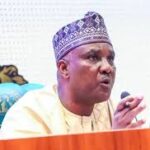
Although the acquisition of nuclear capability has posed a potent danger to world peace, the reality is that we live in a world where conventional inter-state wars are rare. The 2017 Global Peace Index estimates that there has been a ‘very significant increase’ in the total number of deaths related to internal conflicts, with the number skyrocketing from 35,988 fatalities in 2007 to over 285,000 fatalities in 2016.
Joining the global shift in the search for an antidote to national security threats, the Nigerian Army recently hosted a week-long seminar to devise strategies built on intelligent national infrastructure for managing emergent issues in national security. The International Seminar on Managing Asymmetric Security Challenges in the 21st Century held at the Nigerian Army Resource Centre, Abuja, attracted participants from Bangladesh, Cameroon, India, Mali, Niger, Pakistan, United Kingdom, Unites States and the various security agencies in the country.
The Minister of Defence, represented by the Chief of Defence Staff, General Abayomi Olonisakin, flagged off the robust discourse, describing the forum as timely and its theme apt in order to tackle contemporary security challenges.
“Traditionalists focused on military from the threats outside, and some were tempted to define security in pure military terms without much on what is inside of the state. Managing these new threats have become complex by innovations and their level of connectivity around the world,” he said.
The Chief of Army Staff, Lt. Gen. Tukur Buratai disclosed that the forum was premised on his concern for treating with seriousness the management of asymmetric security challenges in particular and world peace, hence the assemblage of no fewer than 150 participants from the academia, military and other security actors both from within and outside Nigeria.
The COAS, who admitted that Nigeria requires international cooperation to defeat insurgency, said all modern armies must explore new frontiers of knowledge to deeply understand new security threats. He was also emphatic that Boko Haram insurgency in the North East has been largely degraded through close collaboration among the armed forces and the immense support of President Muhammadu Buhari who is providing the resources needed in the war against terror.
Buratai solicited global aid towards handling post-conflict humanitarian challenges and the provision of community and infrastructural development to open access to areas of conflicts where insurgents have gained strength.
Dr. Aaron Edwards of the Department of Defence and International Affairs, Royal Military Academy, Sandhurst, United Kingdom, on Global Asymmetric Security Threats Assessment, dwelt on the dangers of asymmetric threats when they combine with other threats and risks in today’s international security environment. He noted that states and non-state actors will continue to resort to asymmetric strategies while residual thinkers should stimulate innovation and cooperation to fight the menace.
“What is new is the potential they have to combine with other threats and risks in today’s international security environment, which makes them potentially more deadly. Therefore, we must build a more robust conceptual understanding of their multifaceted nature so as to mitigate the impact they may have on national, regional and international security,” said Dr Edwards.
Using Northern Ireland, Iraq and Syria as case studies, Dr. Edwards deduced that the complexity of asymmetric threats required states to seek radical thinkers, often further down their chain of command, to make decisions and to give them freedom of movement. “Speed, adaptability, innovation and cooperation are all necessary evils if we are ever to meet the multi-faceted challenge posed by global asymmetric security threats,” he concluded.
The plural nature of the Nigerian state with its complexities presents a fertile ground for incessant agitations and possible internal conflicts. Egbosa Osaghae, professor of comparative politics and vice chancellor of Igbinedion University, Okada, elaborated on the nexus between pluralism and national insecurity.
Conflict, tensions and challenges to the state are endemic in countries as Nigeria, Rwanda, Sudan, India, Brazil and South Africa owing to deep ethnic, racial and religious diversity. Specifically, Prof. Osaghae identified ingredients for conflict as competition for scarce resources and perceived injustices in the competition and struggle for power, resources and benefits.
Prof. Osaghae noted and warned that security of the state cannot be guaranteed by mere use of force, coercion or naked power. Rather, he advocated the pursuit of voluntary obedience which engenders human security and development. He wants a more proactive armed forces involved in problem-solving, service delivery, empowerment, and pro-poor interventions that are commonly associated with peacetime psychological operations.
Prof. Usman Tar, lecturer at the Nigerian Defence Academy, Kaduna, identified the critical place of intelligence to national security, both in war and peace time. Indeed, he noted that credible and reliable intelligence, when used smartly and appropriately, often makes a difference between mission success and failure, and between life and death.
“Intelligence is the first key to a nation’s security, because it can forestall factors and trends which may threaten its sovereignty, stability and the well being of its citizens. In conventional war, intelligence is daunting; in asymmetric warfare – such as the Boko Haram insurgency and Niger Delta militancy – intelligence is even more daunting,” he emphasized.
He also underscored the need for a holistic approach to intelligence gathering and processing even as he identified robust civil-military cooperation as crucial to efficient intelligence gathering and support. The Civilian Joint Task Forces in the North East and local communities, he reiterated, are critical components of operational intelligence.
Speaking on Post Conflict Rehabilitation lessons for Pakistan, Lt. Col. Usman Kiyani of the Pakistan Army said normalcy can be quickly restored to areas ravaged by insurgency by reviving local industries, especially in mining and agro-processing; improving communication infrastructure; promoting skills acquisition through vocational training and effectively checking terror financing.
Drawing from Pakistan’s experience, he asked Nigerian policy makers to embrace a unified approach to tackle terrorism by avoiding the blame game; fencing the border and giving attention to neglected communities. He also suggested intelligence sharing among security agencies and enhancement of surveillance capacity of all law enforcing agencies.
Participants were also tasked to think ahead of conventional methods in tackling asymmetric threats, especially with the increasing sophistication of instruments of chemical, biological and nuclear warfare; but more especially cyber attacks.
Citing the ideological basis of Boko Haram insurgency, Capt. Gautam Marwaha India’s defence adviser in Nigeria, urged participants to pay attention to information warfare, especially from the social media; economic and ecological warfare in form of oil spillage, forest fire and environmental devastations as potential weapons of terrorism. The future asymmetric threats could also come from artificial intelligence as robots and laser weapons could replace humans in conflicts while battles could shift to the space.
Central Bank Governor, Dr. Godwin Emefiele, who was represented by Dr. Oku Nnana, described funding as the heartbeat of terrorism, and noted that since terrorists require funding to finance their operations, there must be strong policies instituted to block their cash arteries.
He said the Nigerian apex bank is monitoring the activities of financial institutions and scanning the financial and money market through several agencies of government; key among which is the Economic and Financial Crimes Commission, aside other legislations to ward off money laundering, from where terrorism gets lifeline.
Sierra Leonean deputy high commissioner in Nigeria, Maj. Gen. Alfred Claude Nelson-Williams (rtd), summed up the essence of the seminar: “This gathering is in the realisation that security world-wide is unpredictable and unreliable. It is certain that no one nation can do it. We need to collaborate and work as a team; that is the essence of this meeting,” he said.
He expressed satisfaction with the mix of ideas and experience at the seminar because it affords policy makers and planners to learn from unique experiences of other nations and how they were able to handle their challenges.
 Join Daily Trust WhatsApp Community For Quick Access To News and Happenings Around You.
Join Daily Trust WhatsApp Community For Quick Access To News and Happenings Around You.


